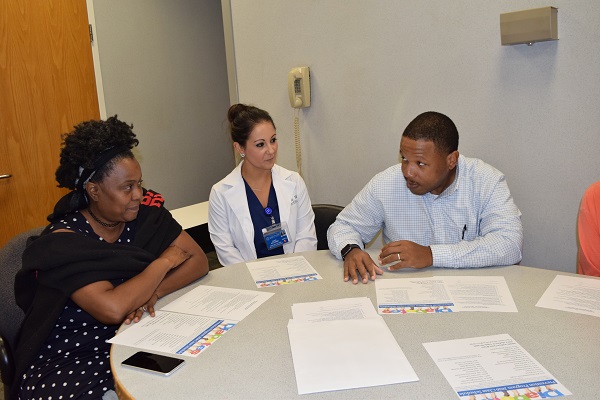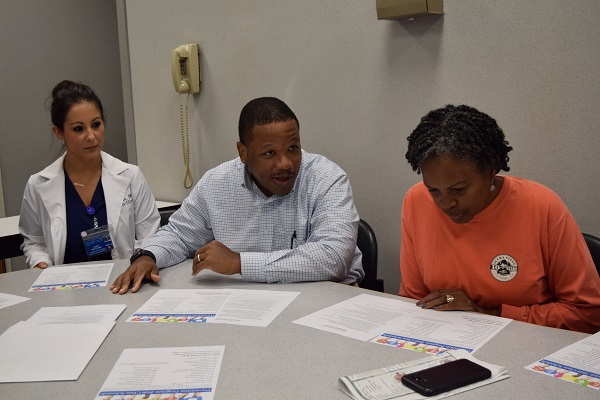
Program Profile:
- North Mississippi Health Services' (NMHS) National DPP lifestyle change program launched in June 2018 in Tupelo, MS, with 15 participants.
- Due to participant interest, the lifestyle change program’s pilot featured additional informal meetings, in addition to regular sessions, including group workout sessions where exercise specialists explained the benefits of physical activity and demonstrated proper use of various exercise machines.
- The program’s project team used direct advertisements such as newsletters, presentations, employee emails, and articles in the local paper to recruit participants.
Highlights:
-
NMHS engaged leaders from multiple segments of their organization, including Human Resources, Wellness Center, Diabetes Treatment Center, Population Health, and Advanced Practice Clinician Fellowship for planning and implementation of a diabetes prevention strategy for their employees.
-
The NMHS physician champion was motivated to start a National Diabetes Prevention Program (National DPP) lifestyle change program after learning about the evidence supporting intensive lifestyle intervention for the prevention of diabetes.
-
The NMHS physician champion utilized the AMA’s “building the business case” presentation template to gain leadership buy-in, presenting to a targeted group at their organization that included the CEO, the president of medical clinics, the president of the North Mississippi Medical Center- Tupelo hospital, the vice president of human resources, the chief strategy officer, the chief medical officer and the chief nursing officer. The group was especially interested in lifestyle intervention for both the prevention of progression and related medical expenditures associated with type 2 diabetes.
North Mississippi Health Services by the numbers:
Locations
45
Coverage area
24
counties in north Mississippi and northwest Alabama (www.nmhs.net/about-us/)
Number of patients
Approximately 600,000
Number of primary care providers
169
Number of health system employees
7,100
Snapshot: Tupelo, MS:

Population
38,111
(www.census.gov/quickfacts/fact/table/tupelocitymississippi,US/PST045218)
Male Female White
53% 47% 60%
Median household income
$45,161
65 years old and over
15%
Helpful hints:
-
Utilize resources: Take advantage of formal technical assistance and guidance that is offered, such as what is provided by the AMA.
-
Identify a project lead: Identify a project lead with the ability to bring key stakeholders and team members from multiple departments together.
-
Be flexible: Consider offering multiple delivery modalities for the National DPP lifestyle change program to meet participants needs.
Implementation through education
How one Mississippi physician champion used training and knowledge to spearhead diabetes prevention programming 
While studying for his board certification in obesity medicine, North Mississippi Medical Clinic’s Vernon Rayford, M.D., learned about the National DPP lifestyle change program and the evidence supporting intensive lifestyle intervention for the prevention of diabetes. So, when presented with the chance to attend a National DPP lifestyle change program coach training, he leapt at the opportunity.
“I enrolled in the training without hesitation,” he explains. “I really didn’t know what I was going to do with it beyond implementing it into an obesity medicine practice.”
Not long after completing the coach training, Dr. Rayford was able to use the learnings gleaned from his participation in his capstone project for a physician leadership program. Armed with evidence of positive outcomes from the original DPP research trial, Reduction in the incidence of type 2 diabetes with lifestyle intervention or metformin, Dr. Rayford estimated the number of employees with prediabetes within his system’s health plan and used these numbers to gain support for implementation of a National DPP lifestyle change program. What was originally purposed to be an informative presentation on the sweeping benefits and need for the National DPP lifestyle change program transformed into implementation planning when key decision makers took note of Dr. Rayford’s findings. “Our vice president of Human Resources was really interested in the program and we assembled a group that started working on making the pilot a reality,” he says.
Part of bringing the pilot to life involved getting the word out about the program. To do so, the project team helped recruit participants by producing newsletters, presentations, articles in the local paper, informational sessions, and even a public service announcement for the broader community. In just a few months, the lifestyle change program launched with an initial cohort of fully engaged participants. “I’m most proud of how well the members of the pilot have come together and how they’ve grown together,” Dr. Rayford reports. He continues, “We’ve added sessions just based on the interest in the participants of the pilot.”
According to Dr. Rayford, implementation of the National DPP lifestyle change program paved the way for the development of an institutional diabetes prevention strategy at NMHS that has potential to reach patients, health plan members, and other employers in the community. Now, not only does the organization focus on improving the quality of diabetes care, it also places heavy emphasis on prevention. For Dr. Rayford, it’s reinforced a valuable lesson: “Preventing diabetes is a whole lot simpler than treating diabetes,” he says.
Now in the recruitment phase for their next cohort, Dr. Rayford and his team are fine tuning the program to ensure its accessibility for a broader range of participants, particularly those unable to attend sessions in-person. Acknowledging that diabetes prevention is not a one-size-fits-all undertaking, the team is brainstorming ways to deliver the program to more people. He explains, “We are looking at ways we can deliver the program and stay true to the curriculum, but do it in a way that respects the fact that we may not have people who are able to meet every Tuesday for 16 weeks. We have to be flexible and use online as well as in-person formats.”
Dr. Rayford says his desire is that NMHS ultimately views the National DPP lifestyle change program as part of a comprehensive effort to address type 2 diabetes. “My hope is that my colleagues see their ability to make a difference on the upstream side is enhanced by having a lifestyle change program, and then they can work to expand diabetes prevention offerings,” he explains.
